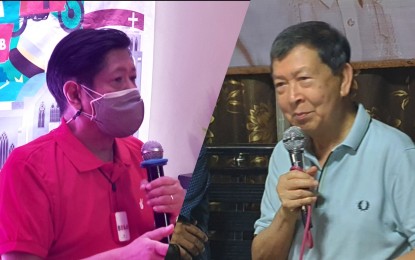
BARNSTORMING NORMIN. Presidential aspirants Ferdinand “Bongbong” Marcos Jr. (left) and Norberto Gonzales pay a visit to Cagayan de Oro City and several provinces in the Northern Mindanao Tuesday (April 26, 2022). With only two weeks left in the campaign period, candidates share their platforms and plans should they win the presidency. (PNA photos by Nef Luczon)
CAGAYAN DE ORO CITY – Two presidential candidates who visited this city and parts of the Northern Mindanao region have disclosed their plans to lower rice prices and farm inputs and offered roadmaps for modernizing the country's agriculture sector.
During his first “face-to-face” press briefing Tuesday afternoon, former senator Ferdinand “Bongbong” Marcos Jr., also referred to as BBM, said his plan to reduce the price of rice to PHP20 per kilo would be achieved through a gradual process.
It would not take place within a year, Marcos said, as the plan relies on multiple factors such as lowering production costs.
"It's a long process because we are to create again the whole agricultural value chain. Meaning, it begins with the R and D (research and development), like when we talk about livestock for raisers, and boats for fisherfolk -- it is the same with (rice) farmers," he said.
Marcos also said he intends to revive the "Masagana 99" program, first introduced by his father and namesake in the 70s.
In a 2020 online forum organized by the University of the Philippines Los Baños' College of Agriculture, Dr. Edgardo Quisumbing, former deputy implementer of the program, described Masagana 99 as a response to the severe rice shortage following infestation and natural disasters.
Former Agriculture secretary Domingo Panganiban, in the same forum, explained that the program collapsed because small farmers were not given enough attention, while the government's agriculture technicians were replaced with non-agriculturists.
Meanwhile, former Defense Sec. Norberto Gonzales in a separate press briefing said he would look into the innovations that enabled neighboring Southeast Asian countries to efficiently utilize their lands to produce rice at lower costs.
Gonzales noted that farmers in the neighboring countries plant rice in areas that are naturally abundant in water sources, and some that are flood-prone.
"But we have the same (geographical and agriculture) features with these countries, and we have to do more research," Gonzales said.
In Mindanao, Gonzales cited the Agusan marsh which has an untapped potential water supply that can be used as irrigation for rice fields.
Gonzales also plans to rehabilitate and plant more mangrove trees, seeing this as an important component of the food cycle that would benefit not only the ecosystem but also has an indirect effect on agriculture. (PNA)
